#1944 deportation of the crimean tatars
Text
On May 18th, The Deportation of Crimean tatars Day...
...and the way this knowledge lingers through my family. my grandma grew up in north Kazakhstan, USSR turned it into a melting pot of ethnicities with the frequency they were sending the deportees there. my grandma's family were deportees from Ukraine on both sides, but to them it happened way before USSR came to existence (it just shows how it was the same old system, just repackaged). my grandma recalled living among not only kazakhs, ukrainians and russians, but also chechens, ingushs, jews, germans, and of course, crimean tatars. many of these demographics were often under supervision, meaning they were not allowed to leave, they had to go and mark their presence every morning, the had limited options in employment. it especially concerned the Crimean Tatars. they were already very poor, having arrived literally barehanded to the foreign, unfamiliar, colder land. on top of that, the were treated like social outcasts due to the "traitor" status. it in turn, barred them from getting better employment. so they were set up for poverty regardless. they lived along the coast line of the river in handmade huts. i don't have the details about how they lived through wintes, but considering what i know now, they probably didn't. Many crimean tatars, that survived the deportation itself, died within the first few years.
Now, compare it to the fact that even PoW germans, who were also contained in this town, were later allowed to settle and develop. they're was no way to know if they were just bystanders or ideologically motivated in the past, during the war. but i find it fucking telling that potential former nazis were given a chance to a normal life, but their victims, who spent years under nazi occupation, were branded as traitors of the State and denied a chance to live normally, even after such a detrimental uprooting, after a literal genocide. USSR was probably hoping they would go extinct on their own from poverty and isolation. Those, who carried on, would still live in the shadow of this false accusations, as well as their children and grandchildren.
And in 2014 russia came back with the same policy. Crimean tatars, who just then managed to begin reclaiming their land, were shunned again. There's political and ethical persecution against them going on since 2014 till this very day. it a crime that international community allowed it to happen again, and that somehow it wasn't a good enough reason enough to seriously oppose russia back then, when we still had time.
#ukraine#crimea#crimean tatars#1944 deportation of the crimean tatars#crimean tatars genocide#thoughts
57 notes
·
View notes
Text
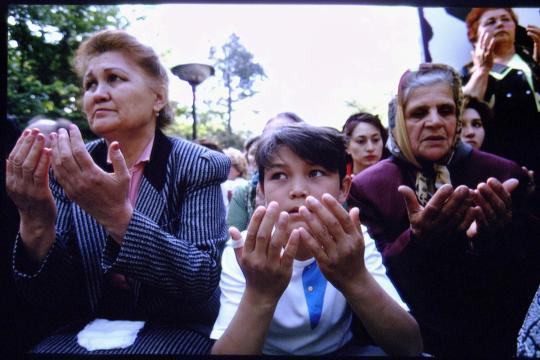
1994: Crimean Tatars mark the 50th anniversary of russia deporting their entire population from their homeland. From the 18th-20th of May 1944 the Tatars were loaded onto cattle trains and removed from their native land.
2024 is the 80th anniversary of Stalin's Crimean genocide.
Since 2014 Crimea has again been occupied by russia.
#settler colonialism#vintage ukraine#ukrainian history#colonialim#russia#imperialism#on this day#crimea#crimean tatars#communism#stalin#putin#ethnic cleansing#genocide#soviet union#russian history#communist
508 notes
·
View notes
Note
also isn’t the eurovision song sung by israel literally also sung by a russian permanent resident??? and in 2015 eurovision let a known proxy of putin perform a song about peace and holding hands for russia???
Yep and yeah. Russia also tried to send a girl who supported the occupation of Crimea to the Eurovision 2017 held in Ukraine - right next year after Jamala won the contest with the song 1944 about the deportation of Crimean Tatars.
And we were getting so much shit for not allowing that girl entry into Ukraine because she broke the law.
So yeah, Eurovision is a big bag of dicks, I'm certainly not telling anyone to watch, much more to support Israel entry this year. But god, these "Eurovision banned russia immediately" when it's not only not the case, it shows how little people know or care about Ukraine unless it's for making it a rhetorical device.
446 notes
·
View notes
Text
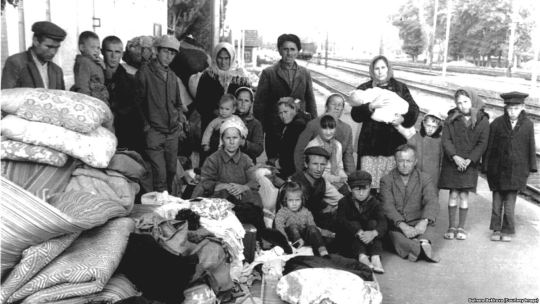
May 18 is the 80th anniversary of the deportation of Crimean Tatars from the territory of Crimea in 1944 by the Soviet authorities. It is also a remembrance day for the victims of this genocide.
Thread on deportation of Crimean Tatars
#ukraine#crimea#crimean tatars#russia#russia is a terrorist state#fuck russia#genocide#russian war crimes#important#history#ussr#soviet union
315 notes
·
View notes
Text
I often hear comments about Crimea and the other territories occupied by Russia being the “price of peace” in Ukraine. I, like many Crimean Tatars and Ukrainians, know that rewarding aggression and brutal occupation does not bring peace.
Crimea is not Russian to be “given back” to Russia. It never was. It never will be.
It is the homeland that has been repeatedly, brutally taken from us; it is the homeland we will not stop fighting for.
My grandmother, Shevkiye, was just 11 years old when on May 18, 1944, Soviet soldiers barged into her home at five o’clock in the morning. World War II was still raging and the Soviet regime had just accused the Crimean Tatars of collaborating with the enemy, the German Nazis – a baseless allegation that led to the unimaginable horror of genocide by deportation.
My great-grandfather was at the front, fighting those same Nazis whom he was accused of collaborating with. So the Soviet soldiers found at home just his wife and four children – the youngest one only a few months old. The soldiers gave them 15 minutes to gather their belongings and did not stop hitting my great-grandmother with their guns as she struggled to pack.
They marched them out of the house and – along with other families from their home village of Ayserez – hoarded loaded them onto a train meant for transporting cattle. The wagons were packed with people and there were no toilets on them; people struggled to breathe. No food or water was provided on the long journey, during which my grandmother’s family remained unaware of their destination.
Exhausted and starved, they focused solely on survival as hunger and disease killed many along the way. One of the most traumatising memories of the journey for my grandmother was witnessing a pregnant woman give birth on the train and then pass away shortly after. A Soviet soldier threw her body out of the wagon while the train kept moving.
After 20 days on the train, they finally arrived at Golodnaya Steppe station in the Mirzachul region of Uzbekistan, where they were unceremoniously unloaded onto a scorching hot platform. With no money or support, they struggled to survive in this unknown land.
They settled in a dilapidated barrack with no roof, windows, or doors. Their food consisted of grass, nettle, potato peels, and rotten potatoes; their drinking water came from irrigation ditches and often caused dysentery. There was no medical assistance available; the Soviet authorities clearly wanted as many Crimean Tatars to die as possible.
The forced deportation of the Crimean Tatars to Central Asia resulted in the death of 46 percent of the population, leaving a gaping wound in the hearts of those who survived. It was the culmination of a century and a half of deliberate and systematic destruction of the Crimean Tatar people, heritage and culture after the subjugation of the Crimean state by Russian imperial forces in the late 18th century. It is on this obliteration of the Crimean Tatars that the bloody myth of Crimea as a “Russian territory” was built.
661 notes
·
View notes
Text
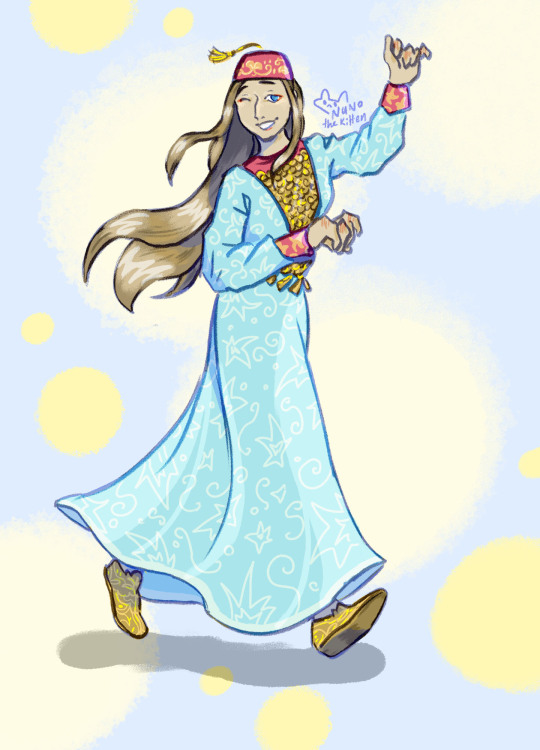
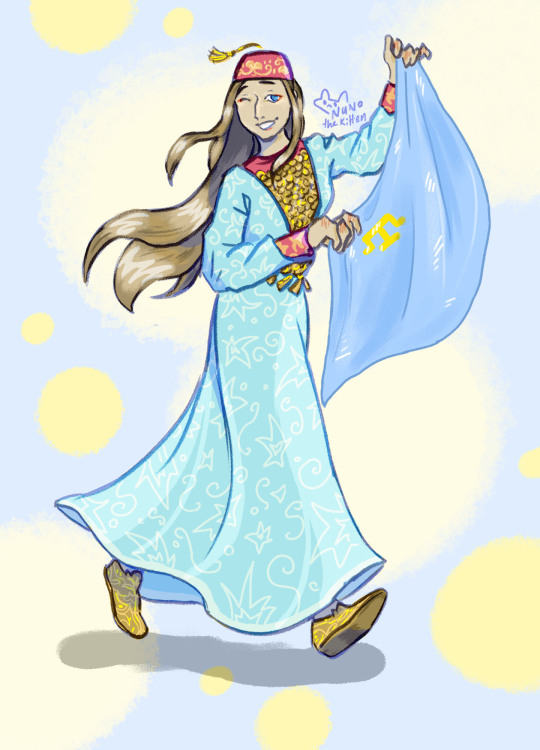
Prompts used:
• Respecting indigenous peoples
• Clothing and accessories
• History
@yourcubitoyourculture
Presenting Pearlescentmoon in Crimean Tatar national costume and with their flag!
Crimea is a peninsula in Eastern Europe, on the northern coast of the Black Sea, almost entirely surrounded by the Black Sea and the smaller Sea of Azov.
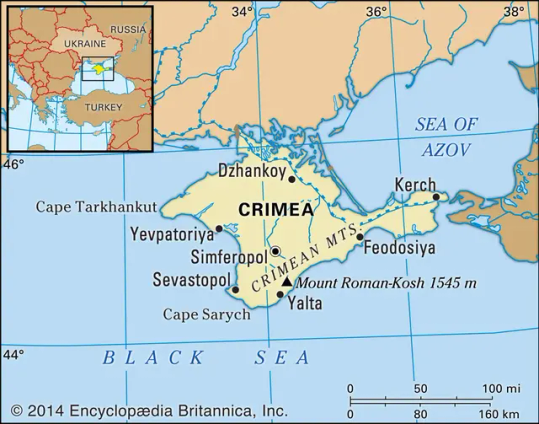
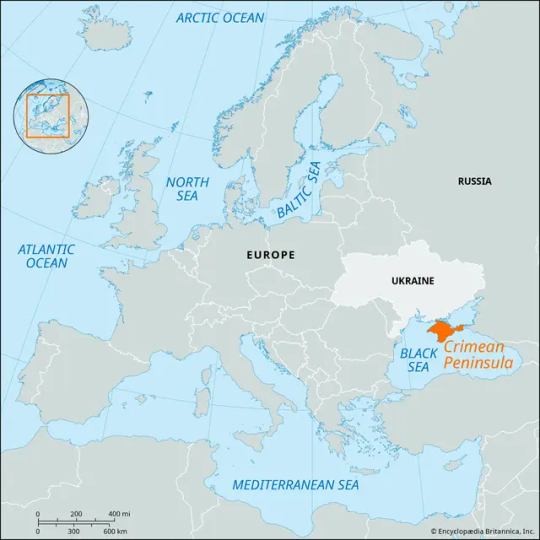
After Ukrainian independence in 1991, the central government and the Republic of Crimea clashed, with the region being granted more autonomy. In 2014, the peninsula was occupied by Russian forces and annexed by Russia, but most countries recognise Crimea as Ukrainian territory.
Throughout history, Crimean Tatars suffered from Russia, one of the largest tragedies being Deportation of Crimean Tatars 1944, when the majority of Crimean population were forecully deported from their homeland to the Uzbek SSR.
Crimean Tatar singer Jamala told the world about it in Eurovision 2016, two years after Russia occupied Crimea once again, with the song named "1944". (watch her performance here)
Crimean Tatar language is on the verge of being forgotten, and less people know about Crimean Tatars even existing, so please, educate yourself, tell others about it, share, talk, don't let all the people who fought agains their opressors die for nothing.
#nuno draws#your cubito your culture 2024#your cubito your culture#hermitcraft#hermitcraft fanart#pearl hermitcraft#pearlecentmoon fanart#pearlescentmoon fanart#pearlescentmoon#hermitblr#mcyt#mcyt fanart#crimea#crimean tatars#qirim
47 notes
·
View notes
Text
Russian methods are still the same
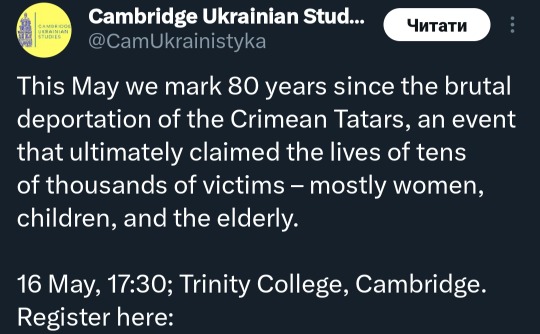

Anyone who is in Cambridge I highly recommend you to visit the place where you can witness evidence of one of the many Russian crimes.
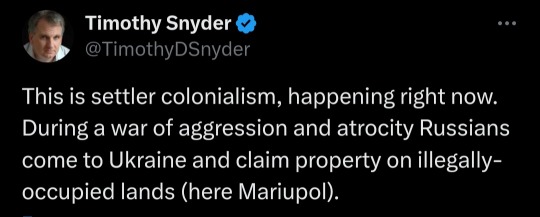
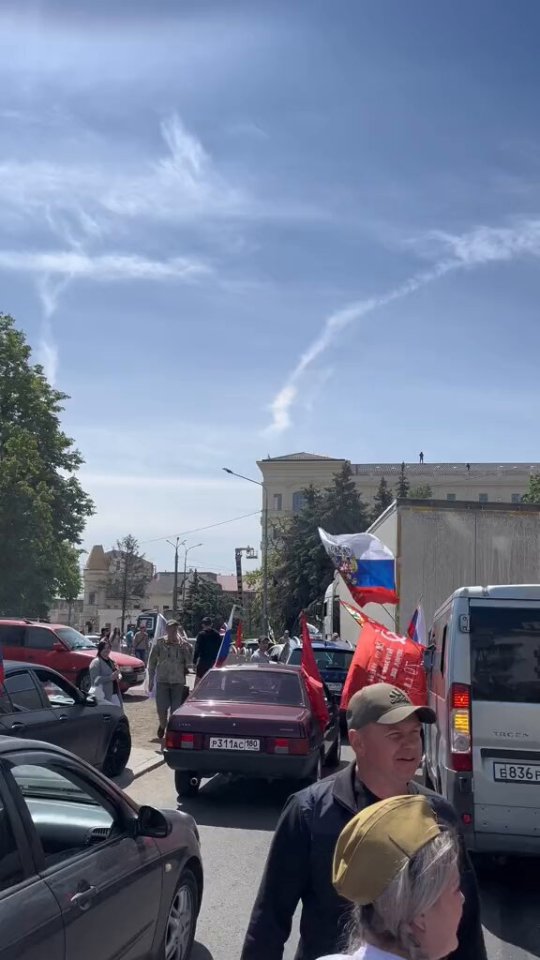
80 years later same scenario. Russians are happy and feel bliss in their impunity. Russians think they are better than the indigenous people, the Mariupol people. They want to live in bloody destroyed buildings where our people are buried. Russians are non-humans. They've done and keep doing the worst crimes for humanity because they never paid for it.
#ukraine#crimea#crimean tatars#russian war crimes#war crimes#genocide#stop the genocide#russo ukrainian war#russian invasion of ukraine#russia is a terrorist state#russian colonialism#russian imperialism#russia must burn#europe#united states#united kingdom#Cambridge#university#education#Exhibition#documentary#important#signal boost#standwithukraine#stand with ukraine#history#deportation
37 notes
·
View notes
Text

1944
Genocide
(c) Andriy Yermolenko
On May 18, the Day of Remembrance of the Victims of the Crimean Tatar Genocide and the Day of Struggle for the Rights of the Crimean Tatars are marked. On this day in 1944, the Soviet government began an operation to deport the Crimean Tatar population from the Crimean peninsula.
#ukraine#украина#україна#crimea#crimean tatars#ussr#stalin#deportation#genocide#крим#крым#кримські татари#крымские татары#геноцид#срср#ссср#сталін#сталин#депортація#депортация
183 notes
·
View notes
Text
My next post in support of Ukraine is:
Next site, is actually today. Today is Crimean Tatar Flag Day. Here's an article about what their flag and today mean to the Crimean Tatar people. Crimean Tatars are the indigenous people of Ukraine from Crimea. Since the illegal annexation of Crimea in 2014, Crimean Tatars suffered from muscovy oppression again. "russia" has just been found guilty by a European court of human rights violations in Crimea since 2014, many of which were perpetrated against Crimean Tatars.
#CrimeaIsUkraine
#StandWithUkraine
#СлаваУкраїні 🇺🇦🌻
26 notes
·
View notes
Text
The day of deportation and 9 May, marked as Victory Day in World War II, Russia, are very close in the calendar. However, if 9 May in Crimea is celebrated with pathos and honor, like in Russia,18 May remains in the shadows. Kazarin says the reason for this is hidden in the Soviet view of War War II as the “Great Patriotic War.”
“In terms of this myth, the entire history of the war was presented as a struggle between absolute Good and absolute Evil. If you add the deportation of Crimean Tatars to this uncomplicated concept, then it turns out that in Crimea, Good defeated Evil and then, on 18 May 1944, it itself committed an atrocity.”
Therefore, it was easier to erase the deportation, as well as Crimean Tatars in general, from history; otherwise, it would destroy everything on what the Soviet Union relied.
Source: 76 years after deportation, Crimean Tatars are again being erased from history in Crimea
#Ukraine#Crimea#Russia#russia is a terrorist state#Pavlo Kazarin#quote#euromaidan press#article in link#Crimean Tartars
11 notes
·
View notes
Text







Yaşlığıma toyalmadım
Men bu yerde yaşalmadım
18-20 of May 1944, russians deported from 200 000 to 500 000 Crimean Tatars, mostly children, women, and seniors (because men went to war). Half of the deported died soon.
#i used some of my fav mangas to redraw#hetalia#hws ukraine#aph ukraine#Crimea#hws aph russia#lithuania in the background
44 notes
·
View notes
Text
Today, May 18th, the anniversary of the mass deportation of the Crimean Tatars (Qirimlar), the indigenous population of the Crimean peninsula of Ukraine, is commemorated. On 18-20 May 1944, the whole nation of around 200,000 Crimean Tatars was forcibly deported to Central Asia, mostly to Uzbekistan by the Soviet regime. Nearly 8,000 of them died during the deportation and tens of thousands perished subsequently in the exile due to harsh conditions.
#wonders of communism rightt??🙃#crimea#crimean tatars#ukraine#history#politics#communism#soviet union#soviet russia#2023
48 notes
·
View notes
Text
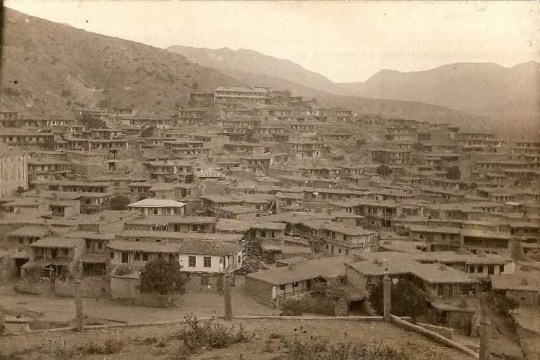
1945: The village of Uskut, Crimea after Stalin's deportation of the entire native population of the Crimean Tatars from the 18th-20th of May 1944.
russian colonisers had yet to move into the houses.
#settler colonialism#russian history#ukrainian history#crimea#communism#ethnic cleansing#genocide#stalin#stalinism#crimean tatars#20th century#ukraine#russian colonialism#colonialism#abandoned#soviet union#ussr#1940s#crimea is ukraine
317 notes
·
View notes
Text


Crimean Tatars today are the only politically organized community capable of opposing Russian dictatorship in the Crimean peninsula.
For the past two years the pro-Russian government, established in Crimea by military means, has established feudal-like governance and police state, restricting the people’s political rights, suppressing any dissent, and demanding unconditional loyalty from every group of the civil society.
Consequently, the political life in Crimea has been shifting towards a deeply reactionary dictatorship. Independent politics, social and human rights activism, and even basic cultural and entertainment activities have become impossible for Crimean people without the approval of the authorities. Since the first few months of Russian domination in Crimea, a massive stream of refugees to mainland Ukraine has established, composed of those who had been assaulted by pro-Russian collaborators, persecuted by secret services or simply driven away by the new political climate.
One of the targets for repressions are the indigenous people of Crimea are Crimean Tatars. They have organized a strong community after their repatriation from Central Asia, to which they were forcibly deported by Stalin’s regime in 1944. As the new Russian government failed to secure the loyalty of almost 300,000-strong people (which has not regained its rights in the historic homeland) it employed the means of terror. The political leaders of Crimean Tatars, as well as activists and their families, are repressed; the people that blemish the picture of civil uniformity are discriminated against on religious and ethnic grounds.
In the last two years regular police searches, detentions, abductions, tortures, cultural and religious restrictions have become commonplace for the Crimean Tatars. Their national representative institution — the Mejlis of Crimean Tatars did not bow in loyalty before the occupation authorities; for that the organization was officially designated as “extremist” and banned in the entire Russian Federation. Members of the Mejlis in Crimea are falsely accused of many crimes; the accusations ranging from staging mass riots to starting a war on behalf of ISIS. It should be said that every protest organized by the Crimean Tatars is exceptionally non-violent and there haven’t been an aggressive statement in their public discourse.
Apparently, the Russian regime is trying to designate Crimean Tatars, the indigenous people who disagree with the occupation of Crimea, a scarecrow, a public enemy. Extremism, terrorism, Islamic fundamentalism and collaboration with Nazis during the German occupation — these are the labels, put on Crimean Tatars in order to imprint racist prejudices upon the loyalist part of the Crimean society and extinguish any sympathy for the oppressed. That is why Crimean Tatars deserve the widest international support more than anyone in the Russian-occupied Crimea.
As anarchists, we do not cherish any false hopes for honesty or decency of the Crimean Tatar’s political representatives. We can hardly believe that members of the Ukrainian Parliament, government officials or President’s advisers can truly be honest and accountable spokespeople of their voters’ interests, just as it is the case with any other elected official in any other system based on representative democracy. At the same time, we have no moral right to sit on the fence, ignoring the discrimination against Crimean Tatars, or to criticize their political organization in the circumstances of state terror directed against them.
We urge anarchists all over the world to express solidarity and support indigenous people of Crimea, which does not cease to resist the Russian dictatorship despite the restrictions, arrests, violence, and intimidation. We cannot foresee the political fate of Crimea, but in any case Crimean Tatars should be free from discrimination and repressions, their national representation (no matter how far removed from the anarchist ideals they might be) should not be a subject of a government ban.
Down with the dictatorship of Russia! Freedom for indigenous peoples of Crimea! Freedom for the Crimean Tatars!
Autonomous Workers’ Union – Kiev
January 19th anarchist committee
#crimea#tatars#crimean tatars#autonomous workers union#awu#unions#community building#practical anarchy#practical anarchism#anarchist society#practical#revolution#anarchism#daily posts#communism#anti capitalist#anti capitalism#late stage capitalism#organization#grassroots#grass roots#anarchists#libraries#leftism#social issues#economy#economics#climate change#climate crisis#climate
3 notes
·
View notes
Text

18-20 May 1944. Crimean Tatars were deported from their historical lands to Central Asia
𝘈𝘭𝘪𝘮 [a 𝘴𝘵𝘰𝘳𝘺 𝘰𝘧 𝘵𝘩𝘦 𝘤𝘭𝘢𝘴𝘴 𝘴𝘵𝘳𝘶𝘨𝘨𝘭𝘦 𝘰𝘧 𝘵𝘩𝘦 𝘸𝘰𝘳𝘬𝘪𝘯𝘨 𝘱𝘦𝘰𝘱𝘭𝘦 𝘰𝘧 𝘊𝘳𝘪𝘮𝘦𝘢 𝘵𝘩𝘳𝘰𝘶𝘨𝘩 𝘵𝘩𝘦 𝘧𝘢𝘵𝘦 𝘰𝘧 𝘵𝘩𝘦 𝘯𝘰𝘣𝘭𝘦 𝘳𝘰𝘣𝘣𝘦𝘳 𝘈𝘭𝘪𝘮 𝘈𝘪𝘥𝘢𝘮𝘢𝘬, 𝘸𝘩𝘰 𝘣𝘦𝘤𝘢𝘮𝘦 𝘢 𝘧𝘰𝘭𝘬 𝘩𝘦𝘳𝘰 𝘧𝘰𝘳 𝘵𝘩𝘦 𝘊𝘳𝘪𝘮𝘦𝘢𝘯 𝘛𝘢𝘵𝘢𝘳𝘴]
Poster for the film directed by Heorgi Tasin, film script by Mykola Bazhan and Ümer Ipçi, Vostokfilm Studios, All-Ukrainian Photo Cinema Administration, Yalta, Crimean ASSR, 1926
4 notes
·
View notes
Text
Today, a few words about the “Crimean Tatar question.” Stalin’s order and the resolution of the USSR State Defense Committee of May 11, 1944, led to tragic effects. Within three days in May 1944, an entire nation that had lived in Crimea for centuries was forcibly deported to Central Asia. According to various sources, between a quarter and half of the people were killed during long-term transportation in packed freight cars, as well as later in barbaric forced living conditions.
At the same time, any public mention of Crimean Tatars was banned in the USSR. The mention of the ethnicity was suddenly absent in subsequent Soviet censuses. Authorities changed about 90 percent of geographic names on the peninsula that had Crimean Tatar names.
The descendants of the survivors of the genocide returned home in 1989. By that time, their family houses were mostly inhabited by Russians who had transmigrated in 1944, immediately after the deportation of the local population. And in 2014, after Russia’s annexation of Crimea, the persecution of Crimean Tatars began again. Dozens of Crimean Tatar activists are currently being held in Russian prisons. From time to time, human rights advocates record the mysterious deaths of Crimean Tatars, and there is a lot of evidence of repression of the Crimean Tatar language.
[...]
So when an acquaintance, a Crimean Tatar, told me her story, it resonated with me completely, despite the 1,000 kilometers separating the places of my birth and hers. By the time her relatives returned to Crimea in 1989, their family house had been inhabited by new owners for decades. So the Crimean Tatars decided to build a new house in another area. They often went to the village market. Once there, amid the various items available for sale, they saw the embossed utensils they had left in their home in 1944.
197 notes
·
View notes